Roman Rumours

In 2020, a team of four students – Finn Murphy, Josephine McEvoy, Nicolette Irving and Zoe Morris – developed the Roman Rumours project. Its aim is to provide lessons in digital literacy for high school students by using Latin to unpick subjective reporting in media headlines.
Introduction
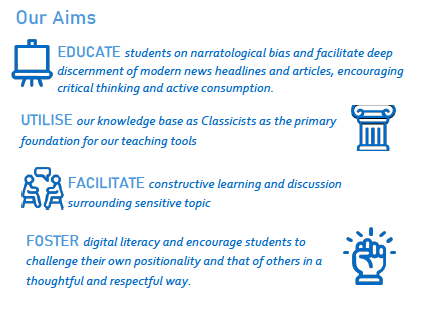
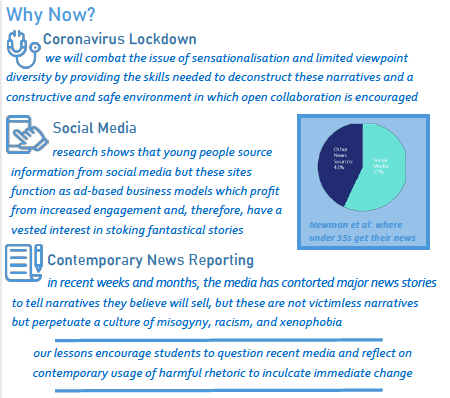
This project has several, overlapping goals – prompted by our awareness that young people increasingly turn to the internet as their primary source of news, information and learning. The digital world is a complex place: social media is poorly regulated, advertising revenue encourages sites to amplify sensational stories, algorithms select and funnel content for users based on past searches, and bots and AI distort ‘reality’ further by promoting certain narratives and burying others. Digital literacy is therefore vital for all, and particularly for users who spend a lot of time online and who are at a stage in their lives when their personal identity, political awareness and belief systems are rapidly evolving. To be ‘digitally literate’, we need a range of skills and competencies: for example, an understanding of how narratives work in different formats, and an ability to analyse them critically; curiosity, a willingness to question and an ability to research a topic for ourselves; self-awareness, particularly in relation to our own positionally, biases and blindspots; and the ability to discuss issues with others respectfully and responsibly. Using Latin language and literature, our project aims to offer training in these important areas.
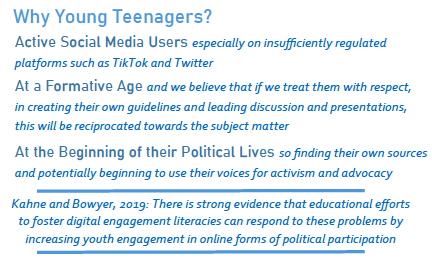
Having identified the issue that we wanted to tackle, we first set about doing some ‘market research’ – to help us better understand our target audience. This involved exploring current curricula, what learning young people already do in this space, and conversations with teachers. This helped us to understand better what young people might need or welcome, and it helped us tailor the details of our planned teaching resources and workshops to issues of particular interest or importance to them. As we learn from guest lecturers like Prof. Neville Morley, it is important in all Applied Classics projects to be ‘audience-aware’: to offer people things that feel relevant, familiar and necessary to them – rather than to swoop in with our own perspectives and deliver content that is of interest primarily to us.
Why Latin?
That said, we were also inspired by our own particular interest and areas of expertise. For us, Classics – especially Latin language and literature – offers lots of potential to teach people how rhetoric works, the impact of different kinds of vocabulary, and the world-building nature of narratives.
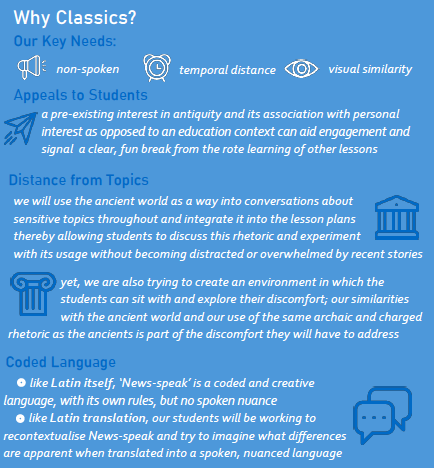
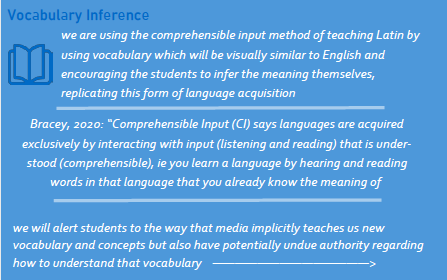
As we explain in our presentation, we think that ‘news-speak’ can be analysed like Latin, as a coded language with lots of hidden nuance, which we can only unpick by close reading. (Also like Latin, most of what we consume online is read, not heard.) We thought that the model of ‘translating Latin’ could be a good way to underline the techniques required to unpick and analyse what a social media narrative or online news story might be telling us. Our idea was that the relative unfamiliarity of Latin might help students perceive the constructedness of ‘news-speak’, making something so familiar and ‘normal’ seem suddenly artificial and even manipulative.
Classics has another string to its bow in our project: the ancient world can provide us with a safe space to discuss sensitive topics – such as gender, sexuality, race, and politics. It is above all when online discussion touches on sensitive topics that content can become controversial and language can become abusive. By exploring Latin vocabulary, phrasing and storytelling around sensitive topics, we can help students become literate in deconstructing toxic or inflammatory discourse in the modern world without having to wade through lots of contemporary abusive or upsetting content.
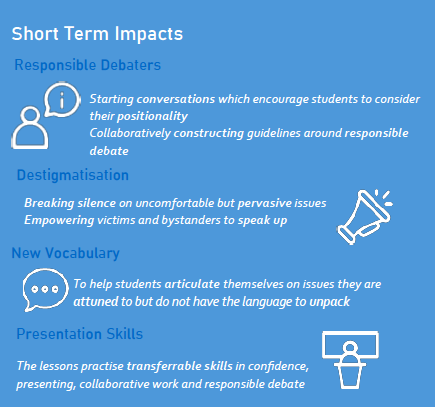
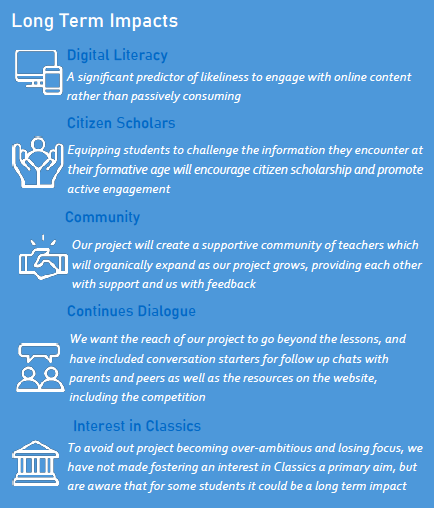
As well as empowering students to critique online content and take responsibility for their own language use, our project also aims to support teachers to expand this kind of ‘Digital literacy learning’ in the classroom with more ancient resources. You can find out more about our goals, methods, and the logistics of our project by browsing our brochure and listening to our presentation below:
What do you think?

- How useful do you think ancient Greek or Latin can be in educating young people about online communications?
- If you were designing an ‘Applied Classics’ project to address fake news, online abuse, or digital literacy, what material would you turn to?
- To what extent might Classics be a hook or a put-off for outreach projects like this?
- Do you think that this kind of work will change perceptions about Latin as ‘a dead language’ or about Classics as ‘out of touch’ with the modern world?